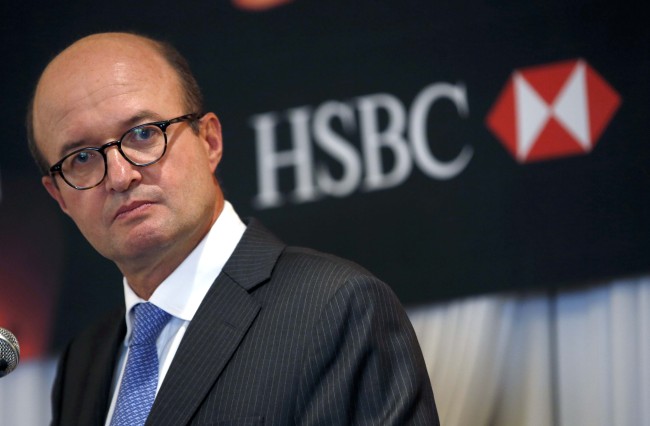South Korea can become one of the world’s most successful hubs for the Chinese yuan, given its geographical proximity to China and the importance of their economic relations, said Martin Tricaud, president and CEO of HSBC in Korea.
“The 19th century was the century of the sterling, the 20th century was the century of the dollar, the 21 century will be the century of the RMB,” Tricaud told the press, referring to renminbi, another name for the yuan.
The London-based financial group’s aggressive push into the yuan transaction business follows Korea and China’s announcement to set up a yuan clearing center in Seoul.
In July, President Park Geun-hye and Chinese leader Xi Jinping agreed to establish a market for direct exchanges of won and yuan this year.
This would make South Korea the world’s fifth-largest trader of the Chinese currency.
“We wish to keep providing support for key government initiatives,” the CEO added.
“The 19th century was the century of the sterling, the 20th century was the century of the dollar, the 21 century will be the century of the RMB,” Tricaud told the press, referring to renminbi, another name for the yuan.
The London-based financial group’s aggressive push into the yuan transaction business follows Korea and China’s announcement to set up a yuan clearing center in Seoul.
In July, President Park Geun-hye and Chinese leader Xi Jinping agreed to establish a market for direct exchanges of won and yuan this year.
This would make South Korea the world’s fifth-largest trader of the Chinese currency.
“We wish to keep providing support for key government initiatives,” the CEO added.

China is Korea’s largest trading partner and largest export destination.
In August, yuan-dominated deposits reached a record high of $20 billion, accounting for about 30 percent of all foreign currency deposits, according to the Bank of Korea.
Korea’s yuan payments soared 563 percent between June 2013 and June 2014, ranking eighth outside China and Hong Kong.

Justin Chan, HSBC cohead of markets in the Asia-Pacific, stressed that companies that have trading partners in China can expand their profits through won-yuan direct transactions.
“For people who want to do business in RMB, the most important consideration is liquidity. With all offshore RMB centers popping up, we have a large pool of RMB deposits sitting outside China,” Chan said.
Along with the increasing use of the yuan globally, the number of offshore yuan trading centers has been rising as well.
Starting with Hong Kong’s RMB center, China has signed memorandums of understanding with six countries to set up offshore centers in the last 11 years, including Taiwan, Singapore, London and Germany.
“The use of RMB has expanded around the world. The RMB is now the second-most used currency in trade finance, and the seventh most used in global payments. People will be able to use the Chinese yuan freely anywhere in the world in 2017,” Chan said.
“None of this is happening elsewhere. Closer to home, Korea has made a lot of progress in the last three years, and in particular, in 2014.”
He downplayed concerns and doubts over possible low demand for direct yuan transactions.
“We always believe liquidity creates liquidity. The more people use direct exchange, the better pricing it will become,” he added.
The close trade relationship between the two countries will eventually boost demand for yuan, he said.
The question is, Chan noted, whether it would be more expensive to trade between RMB and the won, than the won and the dollar.
“That comes down to the commitment of banks, whether banks are willing to curtail the (transaction) price.”
By Suk Gee-hyun (monicasuk@heraldcorp.com)





![[From the Scene] Monks, Buddhists hail return of remains of Buddhas](http://res.heraldm.com/phpwas/restmb_idxmake.php?idx=644&simg=/content/image/2024/04/19/20240419050617_0.jpg&u=20240419175937)





![[Graphic News] French bulldog most popular breed in US, Maltese most popular in Korea](http://res.heraldm.com/phpwas/restmb_idxmake.php?idx=644&simg=/content/image/2024/04/18/20240418050864_0.gif&u=)


![[From the Scene] Monks, Buddhists hail return of remains of Buddhas](http://res.heraldm.com/phpwas/restmb_idxmake.php?idx=652&simg=/content/image/2024/04/19/20240419050617_0.jpg&u=20240419175937)

![[KH Explains] Hyundai's full hybrid edge to pay off amid slow transition to pure EVs](http://res.heraldm.com/phpwas/restmb_idxmake.php?idx=652&simg=/content/image/2024/04/18/20240418050645_0.jpg&u=20240419100350)

![[Today’s K-pop] Illit drops debut single remix](http://res.heraldm.com/phpwas/restmb_idxmake.php?idx=642&simg=/content/image/2024/04/19/20240419050612_0.jpg&u=)